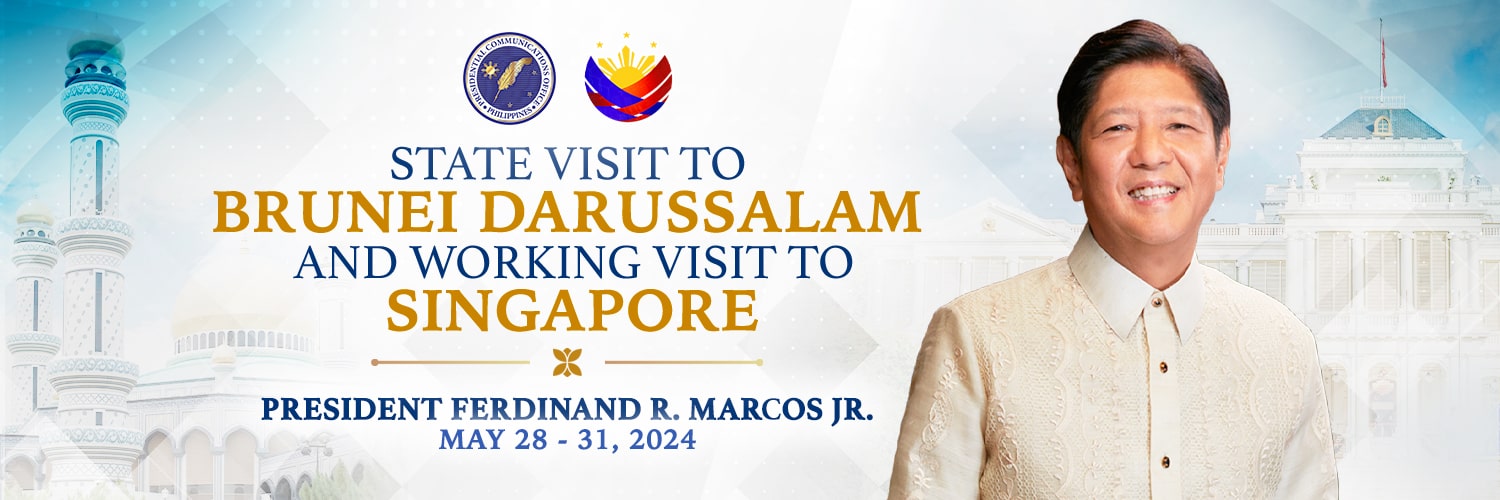
President Ferdinand R. Marcos, Jr. on Wednesday urged business leaders in Brunei Darussalam to seriously consider the Philippines as a prime investment country.
“I enjoin the business leaders of Brunei to seriously consider the Philippines as your prime investment destination,” President Marcos said in his speech during the Philippine Business Forum in Brunei Darussalam.
The forum showcased the Philippine economy’s strength and facilitate trade and investment partnerships focused on agriculture, renewable energy, halal development, among other opportunities in the Brunei Darussalam Indonesia-Malaysia-Philippines East ASEAN Growth Area (BIMP-EAGA) region.
It was organized by the Department of Trade and Industry (DTI) in partnership with the Department of Agriculture (DA) and the Brunei Economy Program with the support of the Philippine Embassy in Brunei.
Speaking before Bruneian business leaders, the President stressed the country’s commitment to foster mutually beneficial outcomes for the business sectors of both the Philippines and Brunei.
“Together, let us approach the future with determination and confidence, striving towards shared prosperity and success,” President Marcos said.
He also cited the positive developments from the Philippines and discussed how they can advance and strengthen the collaboration between the two nations, leveraging the benefits of the partnership through ASEAN, the Regional Comprehensive Economic Partnership Agreement (RCEP), and the Brunei Darussalam Indonesia-Malaysia-Philippines East ASEAN Growth Area (BIMP-EAGA) for a prosperous shared future.
He said vast potentials are seen in sectors such as agribusiness, renewable energy, and Halal industry development.
The President said the Philippines’ trade and investment policy frameworks, established through the ASEAN and RCEP, are fundamental to the agenda for regional economic integration.
He expressed optimism these efforts will be further supported and strengthen the policy of the measures designed for supply chain integration and boost foreign direct investment.
He also emphasized the potential of BIMP-EAGA in building a unified ASEAN production base. BIMP-EAGA is strategically positioned to provide robust supply and value chains supporting the development of small and medium-sized enterprises in key productive sectors.
With the region experiencing a steady rise in population and income, the market for goods and services is expanding significantly, he said. This growing market presents numerous opportunities for businesses and investors to capitalize on, he said.
The President said also the Philippines and Brunei are particularly focused on developing two key economic corridors: the West Borneo Economic Corridor, encompassing Brunei Darussalam; and the Greater Sulu-Sulawesi Corridor, covering Palawan and parts of Mindanao.
These corridors are strategically designed to integrate production with supply chains, offering abundant opportunities for SMEs to flourish, he said.
On the other hand, BIMP-EAGA stands as a beacon of economic integration and development within ASEAN. By investing in infrastructure, promoting sustainable industries, and supporting SMEs, they are paving the way for a more dynamic and interconnected regional economy, the President stressed.
“Together, we can harness the full potential of BIMP-EAGA to build a prosperous and sustainable future for all,” he said.
He also cited the Halal Industry in Brunei. “We eagerly anticipate as well the renewable, the renewal rather of the Memorandum of Understanding on Strengthening Trade and Investment Cooperation in Food Products and Services. With its rich agricultural resources, the Philippines benefits immensely from Brunei’s established halal certification system,” he said.
This partnership promises to create a robust halal industry, offering mutual benefits for the nations. Given the significant opportunities in the global halal market, the Philippines is well-prepared with existing mechanisms in ASEAN and BIMP-EAGA to enhance the integration of the halal supply chains, he said.
On policy reforms, President Marcos said the Philippines is supporting the proposition for the Philippines as Brunei’s strategic partner for regional growth and investments.
“We have broadened the range of liberalized businesses and sectors, through the passage of key landmark legislations, such as the Retail Trade Liberalization Act, the Foreign Investments Act, Public Services Act, and the Renewable Energy Act. Through these measures, we have liberalized foreign ownership in sectors such as air transport, telecommunications, shipping, retail, and renewable energy projects,” he said.
The Philippines is making significant strides as a nation in terms of improving the ease of doing business, demonstrated by efforts to simplify tax payments and regulatory processes.
The reform of fiscal incentives and implementing policies that foster public-private partnerships is crucial for private sector involvement, he said.
The establishment of the Maharlika Investment Fund further demonstrates the country’s commitment to finance priority projects and drive socio-economic development.
“I signed Executive Order No. 18, establishing green lanes for strategic investments, simplifying procedures, and reducing bureaucratic hurdles,” he said. The Green Lanes Initiative for Strategic Investments aims to streamline the process of investment approvals for strategic projects.
It is designed to facilitate and expedite the process for investors looking to set up or expand their businesses in the country, particularly in industries identified as strategic or of significant economic importance.
In addition, the CREATE MORE (Maximize Opportunities for Reinvigorating the Economy) Bill, which proposes amendments to the CREATE Act, aims to strengthen the Philippines’ fiscal and non-fiscal incentives to encourage investments in the strategic priority industries.
The bill improves the ease of doing business by simplifying the approval process and streamlining the Value-Added Tax (VAT) refund system, creating a more investor-friendly environment that aligns with global standards while enhancing the competitiveness.
The President also announced the recent enactment of three priority bills, which further the developmental goals: the Public-Private Partnership (PPP) Code of the Philippines, which facilitates transformative infrastructure growth; the Internet Transactions Act which creates a framework for a robust digital economy and aligns policies with the demands of the 21st century; and the Tatak Pinoy Act or the “Proudly Filipino” Act, which he signed into law on February 26, 2024, designed to strengthen industry development and enhance the Philippines’ participation in global value chains. |PND

